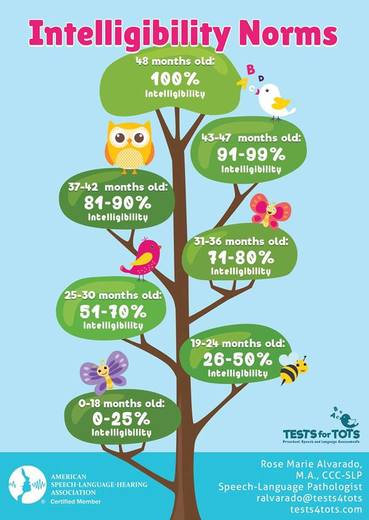What are some signs that my child has delayed speech (articulation) skills?

By the age of 3, your child is unable to:
-American Speech-Language-Hearing Association (ASHA)
- be understood by family and/or caregivers
- correctly produce vowels and the p, b, m, and w sound in words
- repeat when he/she is not understood without becoming frustrated
- be understood by individuals with whom they do not associate regularly
- be understood by family and/or caregivers
- correctly produce t, d, k, g, f sounds
- be asked to repeat without becoming sensitive
- be understood in all situations by most listeners
- correctly produce most speech sounds
- be asked to repeat without exhibiting frustration
- sound errors are prevalent but variable (i.e., "dog" could be produced "dog," "tog," "gog," "god" by same child)
- varies from rarely being able to produce sounds to ongoing speech that is rarely understood, or speech that is usually understood with frequent sound errors
- unaware of sound variations or exhibits varying degrees of frustration and/or anxiety regarding inability to "control speech"
- intonation and/or rhythm of connected speech may sound abnormal
- volume may be consistently or intermittently too loud or too soft
- difficulty producing specific sounds and intelligible speech
- exhibits frustration and/or avoidance of speech
- speech has excessive nasality
- awareness ranges from extremely aware to totally unaware of sound errors
-American Speech-Language-Hearing Association (ASHA)
What are some signs or symptoms of preschool language disorders?
Some children have problems with understanding, also called receptive language. They may have trouble:
Some children also have trouble with early reading and writing, such as:
- Understanding what gestures mean
- Following directions
- Answering questions
- Identifying objects and pictures
- Taking turns when talking with others
- Asking questions
- Naming objects
- Using gestures
- Putting words together into sentences
- Learning songs and rhymes
- Using correct pronouns, like "he" or "they"
- Knowing how to start a conversation and keep it going
Some children also have trouble with early reading and writing, such as:
- Holding a book right side up
- Looking at pictures in a book and turning pages
- Telling a story with a beginning, a middle, and an end
- Naming letters and numbers
- Learning the alphabet
What treatments are available for difficulty with reading and writing skills?
The goals of speech and language treatment for the child with a reading problem target the specific aspects of reading and writing that the student is missing. For example, if the student is able to read words but is unable to understand the details of what has been read, comprehension is addressed. If a younger student has difficulty distinguishing the different sounds that make up words, treatment will focus on activities that support growth in this skill area (rhyming, tapping out syllables, etc.).
Individualized programs always relate to the school work. Therefore, materials for treatment are taken from or are directly related to content from classes (e.g., textbooks for reading activities, assigned papers for writing activities, practice of oral reports for English class). The student is taught to apply newly learned language strategies to classroom activities and assignments. To assist the child best, the SLP may work side-by-side with the child.
-American Speech-Language-Hearing Association (ASHA)
Individualized programs always relate to the school work. Therefore, materials for treatment are taken from or are directly related to content from classes (e.g., textbooks for reading activities, assigned papers for writing activities, practice of oral reports for English class). The student is taught to apply newly learned language strategies to classroom activities and assignments. To assist the child best, the SLP may work side-by-side with the child.
-American Speech-Language-Hearing Association (ASHA)